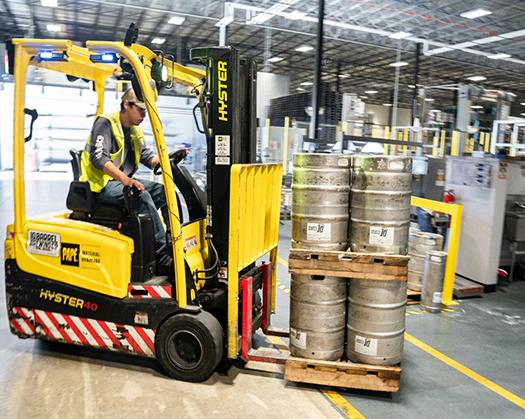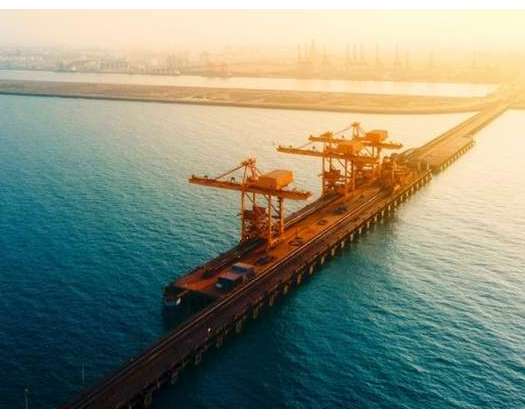Monterrey: The expansion of Chinese manufacturing along the US-Mexico border has significantly enhanced the local economy, establishing an industrial center in northern Mexico. This region features one of the numerous "industrial Chinatowns" that have developed, as Chinese firms set up factories to leverage the USMCA trade agreement and gain tariff-free access to the US market, according to CNN.
Nevertheless, the potential for tariffs under the administration of US President-elect Donald Trump has raised concerns among local businesses regarding their future.
Industrial parks in areas like Monterrey have seen advantages from Chinese companies moving production closer to the US to circumvent tariffs. The combination of proximity to the US market and low labor costs has made Mexico an appealing destination for Chinese manufacturers. These firms produce a diverse array of products, including electronics, furniture, and automotive components, all aimed at the US export market.
However, the looming threat of tariffs has introduced a level of uncertainty. Matt Harrison, president of Kuka Home North America, which operates a furniture manufacturing facility in Monterrey, voiced his worries that tariffs could jeopardize his business. "A 25 percent tariff on Mexico would effectively put me out of business," Harrison stated. His company, along with many others in the region, is closely monitoring how the new administration will approach trade relations with Mexico.
Despite the tariff concerns, Cesar Santos, a land developer in the region, remains optimistic that Chinese manufacturers will persist in their investments in Mexico. Since 2013, when he began developing 1,500 acres for factory use, he has witnessed a surge in Chinese investment. Santos considers Mexico a strategic manufacturing hub due to its closeness to the US. "We are just 160 miles from Texas. Therefore, within 24 to 48 hours, products can reach the US from here. This logistical advantage is crucial and beneficial for them," Santos remarked.
Santos' industrial park, Hofusan, is home to factories from 40 Chinese firms. He remains hopeful about the prospects for these businesses, even in light of possible tariffs. Many companies still consider Mexico a preferable option for manufacturing compared to China, regardless of tariff implications. Santos pointed out that the US tariffs on Chinese products initiated in 2018 have encouraged Chinese firms to relocate to Mexico. "In fact, that benefited us. When tariffs were imposed on China, those companies turned to us," he stated.
The surge in Chinese investment has been remarkable over the last ten years. Direct investments from China to Mexico increased from USD 5.5 million in 2013 to USD 570 million in 2022. In the first half of 2024 alone, Mexico received USD 235 million from China, according to government data.
Despite the ongoing uncertainty regarding tariffs, Santos is optimistic that Mexico will remain a desirable location for Chinese enterprises. He has even contributed land for local police facilities to enhance safety in the region.
While some Mexican developers, like Ramiro Gonzalez, have welcomed the strengthening ties between Mexico and China, challenges persist. Gonzalez, whose construction firm collaborates with Chinese investors, noted the cultural differences between Chinese companies and local employees, as reported by CNN.
"The Chinese culture values time, so they expect efficiency in all aspects," Gonzalez remarked, emphasizing the necessity for quicker construction and design processes to align with their expectations.
Zhang Jianqiu, an engineer offering services to Chinese factories in Mexico, recognized the challenges of adapting to life in a new country. Although he experiences homesickness, Zhang has adjusted by learning Spanish and embracing the local culture. He views the potential effects of tariffs as uncertain, mentioning that Chinese companies are "waiting and watching" the political landscape.
Many Chinese firms are currently in a state of observation and deliberation, he noted. "They will ultimately reach a conclusive decision."
The imposition of tariffs has already had an impact on certain businesses. For example, Harrison has paused the construction of a new facility intended to handle a surge in orders from the United States, concerned that tariffs will render his products prohibitively expensive. Instead, he is considering alternatives in Vietnam, where labor and manufacturing expenses are significantly lower. "No company can absorb a 25 percent increase," Harrison stated. "Ultimately, it is the American consumer who bears the cost, leading to immediate inflation."
In spite of the prevailing uncertainty, local workers in Mexico remain dedicated to their employment. The Kuka Home factory, which manufactures furniture for upscale retailers such as Crate & Barrel and Williams Sonoma, has a workforce exceeding 1,100 individuals. "This has been a tremendous opportunity. Currently, we employ over 1,100 people," remarked Eric Espinoza, a factory supervisor. He cautioned that tariffs could lead to increased prices for American consumers, but emphasized that job losses in Mexico would have far graver implications. "The absence of these jobs would impact many families," he added.
Economists caution that tariffs may result in higher prices for American consumers, as businesses are likely to transfer the additional costs. While tariffs could enhance the competitiveness of domestically produced goods, other variables such as consumer demand and interest rates may further complicate the economic landscape.
Mexican enterprises have reaped the benefits of increased Chinese investment within the country, yet they remain cognizant of the potential for changes in the trade relationship influenced by the political climate. As President-elect Trump readies to assume office, Mexico must navigate a complex relationship with both the United States and China. "Currently, Mexico finds itself in a challenging position as it evaluates its next steps," stated Horacio Carreon, an assistant professor of international business at Tecnologico de Monterrey.
At present, many stakeholders in Mexico's industrial Chinatowns maintain a sense of optimism, although they are also bracing for the possibility of new trade barriers. Should US tariffs become excessively onerous, businesses may seek opportunities in other regions for growth, according to CNN.
"If the US market becomes overly difficult, we will explore options in Latin America and beyond," Santos remarked, suggesting that the future of these industrial zones may hinge on the evolution of trade dynamics.












